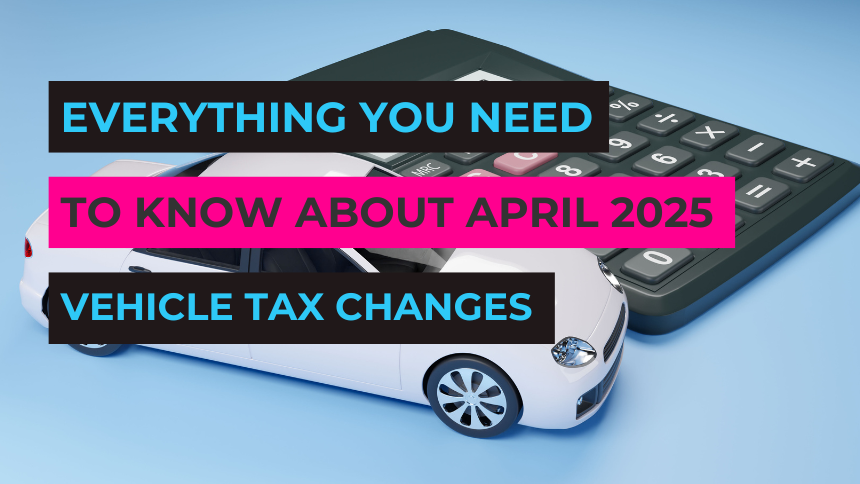In case you missed it, the UK government is making significant changes to vehicle tax regulations effective from April 2025, aiming to promote environmental sustainability and adapt to the evolving automotive industry. The changes will impact businesses that use company vehicles, especially those incorporating electric vehicles (EVs).
It’s important to stay up to date with these changes if you want to remain tax effective (which, of course, you do!). Here’s everything you need to know:
1. The April 2025 Vehicle Tax Changes
The upcoming changes to vehicle tax regulations are part of the government’s broader strategy to encourage the adoption of low-emission vehicles and ensure fair taxation across all vehicle types. These adjustments will affect both new and existing vehicles, with specific implications for electric vehicles and company car taxation.
2. Vehicle Excise Duty (VED) Adjustments
Vehicle Excise Duty, commonly known as road tax, is undergoing notable changes:
- Zero-Emission Vehicles Registered On or After April 1, 2025: New zero-emission cars will incur a first-year VED rate of £10. From the second year onwards, these vehicles will be subject to the standard annual rate, which is set at £195.
- Zero-Emission Vehicles Registered Between April 1, 2017, and March 31, 2025: Owners of these vehicles will start paying the standard annual VED rate of £195 from April 2025.
- Alternative Fuel Vehicles: The existing £10 VED discount for hybrid and alternative fuel vehicles will be removed. Consequently, these vehicles will also be subject to the standard rate of £195.
3. Company Car Tax (Benefit-in-Kind) Revisions
The Benefit-in-Kind (BiK) tax rates for company cars are set to increase:
- Zero-Emission Vehicles: The BiK rate for zero-emission vehicles will rise from the current 2% to 3% starting April 6, 2025. This rate is scheduled to increase by 2 percentage points annually, reaching 9% by the 2029/2030 tax year.
- Vehicles Emitting 1g to 50g CO₂/km: For vehicles within this emission bracket, the appropriate percentage will be 18% in 2028/2029 and 19% in 2029/2030.
- Other Emission Bands: All other emission bands will see a 1 percentage point increase per year in 2028/2029 and 2029/2030, with a maximum appropriate percentage of 39% by 2029/2030.
4. Van Benefit Charge and Fuel Benefit Charges
Adjustments to van benefit charges and fuel benefit charges for both cars and vans are as follows:
- Van Benefit Charge: The flat-rate van benefit charge will increase to £4,020 from April 6, 2025.
- Car Fuel Benefit: The multiplier for calculating the car fuel benefit will rise to £28,200.
- Van Fuel Benefit: The flat-rate van fuel benefit charge will increase to £769.
5. Implications for UK Businesses
The vehicle tax changes have several implications for businesses:
- Financial Planning: Businesses should anticipate increased costs associated with company vehicles, particularly with the removal of VED exemptions for electric vehicles and the rise in BiK rates.
- Fleet Management Strategies: To mitigate higher tax liabilities, businesses might consider transitioning to vehicles with lower emissions or investing in zero-emission vehicles before the new rates take effect.
- Sustainability Goals: Aligning fleet choices with environmental objectives can provide both tax advantages and support corporate social responsibility initiatives.
6. How to Prepare for the Transition
Here’s what you need to do to adapt to these changes:
- Assess Current Vehicle Policies: Make sure to review existing vehicle policies to ensure they align with the upcoming tax changes and consider updating them to reflect new tax implications.
- Consult Tax Professionals: Have a chat with our friendly tax advisors at The Numbers Quarter to understand the specific impacts on your business and develop strategies to improve tax efficiency.
- Educate Employees: Inform employees about how these changes may affect their company car benefits and explore alternative options if necessary.
If you’re keen to understand how the vehicle tax changes specifically impacts your business, simply schedule a consultation with our team of local accountants in Bedford today. We’re ready to guide you in the right direction and help your vehicle tax planning.
